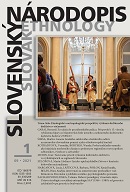Dobové paradigmy v kontexte dejín Ústavu etnológie a sociálnej antropológie SAV (1946-1989): od generácie zakladateľov po generáciu budovateľov
Contemporary Paradigms in the Historical Context of the Institute of Ethnology and Social Anthropology SAS (1946-1989): From the Generation of Founders to the Generation of Builders
Author(s): Tatiana Zachar PodolinskáSubject(s): Cultural Anthropology / Ethnology, Higher Education , History of Education, WW II and following years (1940 - 1949), Post-War period (1950 - 1989)
Published by: Ústav etnológie a sociálnej antropológie Slovenskej akadémie vied
Keywords: research on institution’s history; contemporary paradigms; the history of thinking; ethnography; ethnology; Institute of Ethnography SASA/SAS; Institute of Ethnology SAS;
Summary/Abstract: The aim of this study is to offer a paradigmatic analysis of the development of the discipline – called predominantly “ethnography” and “ethnology” in the 20th century Slovakia – in the background of the history of its development within one of the key institutions in Slovakia where research is conducted – the Institute of Ethnology and Social Anthropology of the Slovak Academy of Sciences (IESA SAS). It is extremely interesting in our case how, in a relatively short period of its existence, the institution under study reacted flexibly to changes in the political regimes and discursive paradigms which resulted in system changes. The changes in external settings forced the institution to interact and intervene, which was reflected in different intensities of reorganisation of the internal ecosystem in different periods. On the other hand, it is also possible to observe major resilience which enabled the institution to preserve internal consistency of its processes. In the case of the IESA SAS, we can rather speak of “micro-historical temporalities” (measured approximately over a period of individual decades) in the background of more general longue dureé processes (i.e. long-lasting and global historical changes) in which work teams, specific personalities at leadership positions aswell asthe external ecosystem were significantly engaged. Within the history of the institution, the study also observes the life and modus operandi of two important generations, denoting them, in terms of the metaphorical discourse, as the generation of founders(1950s and 1960s) and the generation of builders(1970s and 1980s).
Journal: Slovenský národopis
- Issue Year: 69/2021
- Issue No: 1
- Page Range: 137-165
- Page Count: 29
- Language: Slovak

